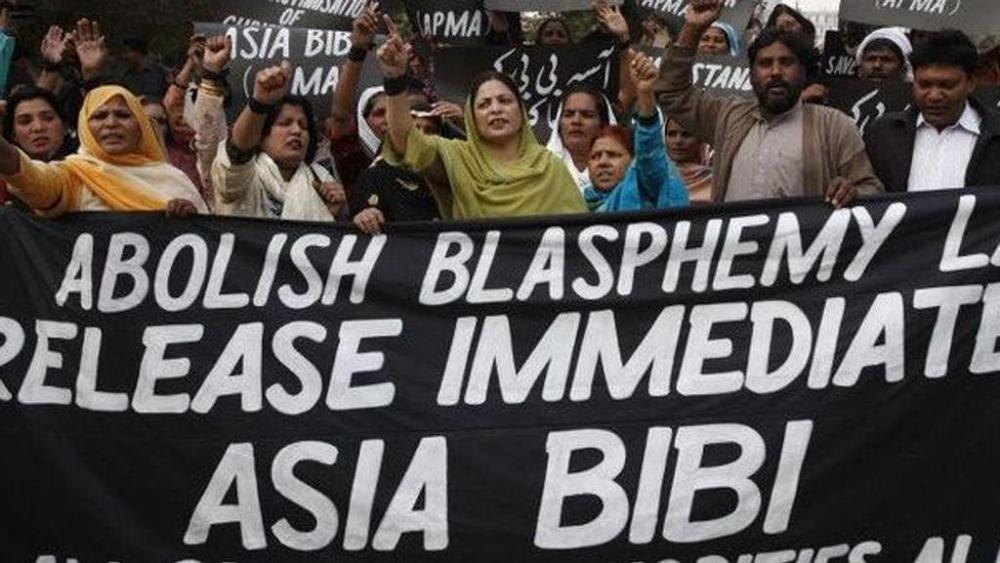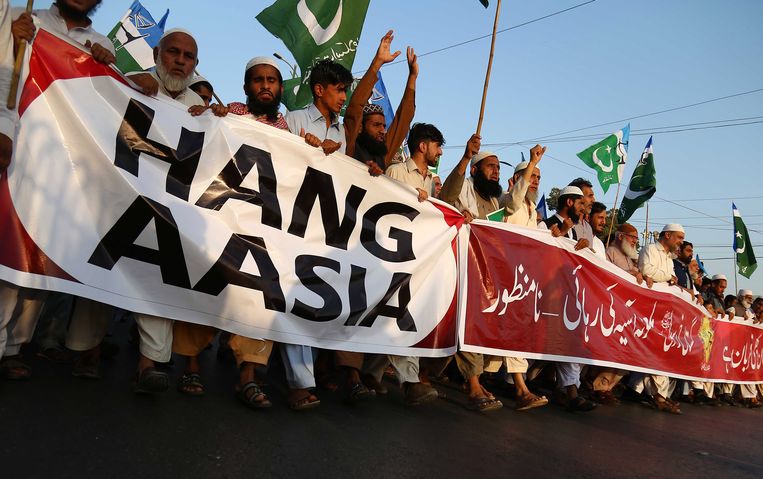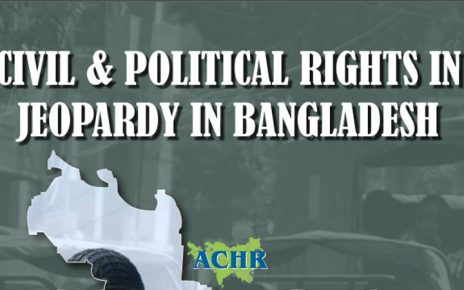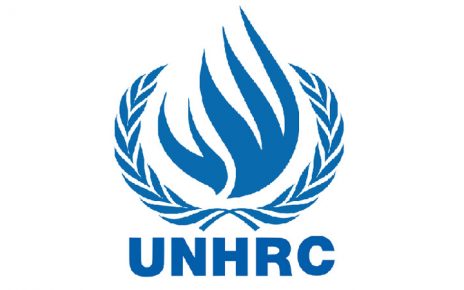Pakistan has turned into a prison for Aasia Bibi. After acquittal by the Supreme Court from concocted blasphemy charges on 31 October 2018, the government of Pakistan entered into an agreement with the Tehreek-e-Labaik to place her name on the Exit Control List to prevent her from leaving the country which is indispensable to protect her life and further to not contest the review petition filed against her acquittal.
The issues of this briefing are:
2. Blasphemy by Aasia Bibi: A case of “concoction incarnate”
3. Blasphemy laws: The abused weapons against religious minorities
4. International consensus against the blasphemy laws of Pakistan
5. Pakistan has turned into a prison for Aasia Bibi

1. Executive summary
Despite the Supreme Court of Pakistan acquitting Aasia Bibi from blasphemy charges after nine-years being on the death row on 31 October 2018, the government of Pakistan has failed Aasia Bibi. Pakistan failed to take action against the Tehreek-e-Labaik (TLP) leaders who openly called for death to Chief Justice of Pakistan and his accompanying judges who acquitted and ordered the release of Aasia Bibi. Instead, the government of Pakistan led by Prime Minister Imran Khan signed an agreement with the TLP on 2 November 2018 under which the Government of Pakistan agreed to “initiate legal process” to place Aasia Bibi’s name on the Exit Control List to prevent her fleeing from the country and further that it would not contest the review petition filed against her acquittal.[1] As Aasia Bibi’s lawyer Saiful Malook left the country fearing threats to his life on 2 November 2018,[2] she is effectively defenceless during the hearing of the review petition before the Supreme Court.
Aasia Bibi is currently living in hiding given the threats to her life and Pakistan has effectively turned into a big prison for her.
2. Blasphemy by Aasia Bibi: A case of “concoction incarnate”
In 2009 Aasiya Noreen, a Christian woman and a mother of five, was thrust into the limelight in a deeply conservative Pakistan for allegedly breaching the country’s blasphemy laws. In what has now come to be known as the “Aasia Bibi Blasphemy case”, she was convicted of blasphemy by a Pakistani court in 2010, receiving a sentence of death by hanging. She became the first woman to be sentenced to death for blasphemy in the country.
The case brought into spotlight the many concerns surrounding Pakistan’s blasphemy laws and particularly the way the blasphemy laws have been misused against the country’s religious minority communities. The controversial blasphemy laws introduced by General Zia-Ul-Haq from 1982 to 1986 have been rejected across the spectrum. The Aasia Bibi case has become a symbol of how hatred, intolerance, vague and archaic laws have facilitated persecution of religious minorities in Pakistan.
On 14 June 2009, while working as a farmhand in fields with other women, Bibi was asked to fetch drinking water. Some of the other women – all Muslims – refused to drink the water as it had been brought by a Christian, thus sparking a row.[3] A Muslim woman later went to a local cleric and accused Bibi of committing blasphemy against the Prophet Mohammed – a charge punishable by death under the blasphemy laws. Bibi denied the charges labelled against her.[4]
Bibi was arrested and prosecuted under Section 295-C of the Pakistan Penal Code. She was convicted and sentenced to death with a fine of Rs.100,000/ by a trial court in November 2010[5], with the Lahore High Court upholding her conviction four years later.
In a long-delayed yet a landmark decision, Pakistan’s Supreme Court on 31 October 2018 struck down the death sentence for blasphemy handed down to Aasia Bibi thus freeing her after nine years on death row. The three-member bench led by Chief Justice of Pakistan, Saqib Nisar, ordered Bibi’s release on 31 October 2018 in Islamabad.[6]
The Supreme Court observed that:
“The prosecution had categorically failed to prove its case beyond the reasonable doubt. …….It is not for the individuals, or a gathering (mob), to decide as to whether any act falling within the purview of Section 295-C has been committed or not, because as stated earlier, it is the mandate of the Court to make such decision after conducting a fully qualified trial and on the basis of credible evidence brought before it. No such parallel authority could in any circumstances be bestowed upon any individual or a group of persons.”[7]
Justice Asif Khosa noted that the two sisters who accused Bibi “had no regard for the truth” and that the claim she smeared the prophet in public was “concoction incarnate”.[8]
3. Blasphemy laws: The abused weapons against religious minorities
In Pakistan, blasphemy against Islam and its Prophet can carry a compulsory death sentence as provided under Chapter 15 of the Pakistan Penal Code (PPC). Section 295 B and C and 298 A, B and C impose a variety of penalties for different forms of blasphemy, including death penalty, for anyone found to have, by words or visible representation or by an imputation or insinuation, directly or indirectly, defiled the name of the Prophet Muhammad. Similarly, anyone blamed as a blasphemer against the Quran would be awarded life imprisonment under section 295C of the PPC.[9]
According to the government’s 2017 census, it has a population of 207 million people out of which 96.28% are Muslim, 85–90% are Sunni, 10–15% are Shi’a, 0.22% Ahmadi, 1.59% are Christian and 1.60% are Hindu by faith.[10] However, the blasphemy laws have been disproportionately used against the minorities.
In a joint submission to the UN Committee on Economic, Social and Cultural Rights during its sixty-first session (29 May-23 June 2017), the civil society organizations (CSOs) of Pakistan stated that over half of the blasphemy victims were non-Muslims although they are merely a tiny fraction of Pakistan’s population. At least 1,446 persons had been accused under the “blasphemy laws” from 1987 to 2014[11] out of which 724 were against Muslims, 501 against Ahmadis, 185 against Christians, 26 against Hindus and 10 whose religion could not be ascertained.[12] About 336 cases were filed in Punjab province alone in 2014.[13]
Between 1927 and 1985, only 10 blasphemy cases were reportedly heard in courts.[14]
Since 1986, the blasphemy laws have been overwhelmingly used to persecute religious minorities and settle personal vendettas.
According to the Al Jazeera, at least 74 people have been killed in violence related to blasphemy allegations since 1990.[15] At least 50 people accused of blasphemy were murdered before the trials were completed.[16] In April 2017, Mashal Khan, a journalism student at the Abdul Wali Khan University in Mardan in Khyber Pakhtunkhwa province, was beaten and shot dead by a vigilante mob after accusing him of publishing blasphemous content online and promoting the Ahmadi faith.[17]
Two high-profile political leaders were murdered after they spoke out against the blasphemy law. On 4 January 2011, former Punjab Governor Shaheed Salman Taseer, who spoke out in support of Bibi, was gunned down in broad daylight in Islamabad.[18] Shahbaz Bhatti, Pakistan’s minorities’ minister, and an advocate of reform of the country’s blasphemy laws, was assassinated on 2 March 2011 as he left his Islamabad home.[19] Both Bhatti and Taseer championed the case of Aasia Bibi and spoke against the blasphemy law and demanded reforms.
4. International consensus against the blasphemy laws of Pakistan
There is an international consensus that blasphemy laws of Pakistan violate international human rights standards and the Government of Pakistan must repeal the same.
Pakistan has ratified a number of UN human rights conventions and each of the Treaty Bodies expressed concerns about the persecution of religious minorities under blasphemy laws and recommended specific measures.
UN Human Rights Committee (2017)
In its Concluding observations on the initial report of Pakistan[20] the UN Human Rights Committee expressed its concern about the blasphemy laws, including sections 295 and 298 of the Pakistan Penal Code, that carry severe penalties, including the mandatory death penalty (sect.295(C)), and reportedly have a discriminatory effect, particularly on Ahmadi persons (section 298(B) and (C)); by the very high number of blasphemy cases based on false accusations and by violence against those accused of blasphemy, as illustrated by the case of Mashal Khan; and by repeated reports that judges who hear blasphemy cases are frequently harassed and subjected to intimidation and threats. The Committee also expressed concern over the continued reports of hate speech and hate crimes against persons belonging to religious minorities and their places of worship and by the religiously biased content of textbooks and curricula in public schools and madrasasas.[21]
The UN Human Rights Committee recommended Pakistan to repeal all blasphemy laws or amend them in compliance with the strict requirements of the Covenant, including as set forth in the Committee’s general comment No.34 (2011) on the freedoms of opinion and expression; and to ensure that all those who incite or engage in violence against others based on allegations of blasphemy, as well as those who falsely accuse others of blasphemy, are brought to justice and duly punished; to take all measures necessary to ensure adequate protection of all judges, prosecutors, lawyers and witnesses involved in blasphemy cases; to ensure that all cases of hate speech and hate crimes are thoroughly and promptly investigated and that perpetrators are prosecuted and, if convicted, punished.[22]
UN Committee against Torture (2017)
In its Concluding observations on the initial report of Pakistan, the UN Committee against Torture has on 1 June 2017 called on the Pakistani authorities for due diligence to prevent violence by non-State actors. The Committee expressed concern about reports of violence against religious minorities and inadequate efforts by the State party’s authorities to protect vulnerable individuals, particularly members of Shia, Christian and Ahmadiyya communities and individuals accused of blasphemy, from violence by non-State actors. The Committee was particularly concerned about the conduct of the Pakistani authorities in the case of Mashal Khan, who was killed by a mob after being accused of blasphemy. The Committee also expressed concern by reports that the Pakistani authorities have sometimes refrained from promptly investigating reports and prosecuting perpetrators of activities including abduction for ransom by groups including the Haqqani Network and Lashkar-e-Tayyaba.[23]
The Committee called on Pakistan to protect members of vulnerable groups, including religious minority communities and individuals exercising freedom of opinion or expression, from violence perpetrated by non-State actors. The Committee recommended that Pakistan should ensure that all acts of violence by non-State actors, including mob violence, are investigated promptly, effectively and impartially, that perpetrators are punished and that victims obtain appropriate redress.[24]
UN Committee on the Elimination of Racial Discrimination (2016)
The Committee on the Elimination of Racial Discrimination (CERD Committee) in its concluding observations on the combined twenty-first to twenty-third periodic reports of Pakistan on 3 October 2016 expressed concern at the broad and vague definition of offences against religions provided for in those laws, including sections 295, 295-A, 295-B, 295-C, 298-A, 298-B and 298-C of the Pakistan Penal Code 1860, and the disproportionate use of those laws against individuals belonging to ethnic and religious minorities. It also expressed concern at reports about the large number of blasphemy cases based on false accusation and the absence of investigation and prosecutions, as well as reports that the judges who hear blasphemy cases and those accused of blasphemy are facing intimidation, death threats and murder (arts. 5 and 6).[25]
The CERD Committee recommended that Pakistan to consider repealing the blasphemy laws that go against freedom of expression and religion, as established in the Constitution. It also recommended taking all measures necessary to prosecute and punish those who have made false accusations and to provide effective remedies to the victims of false accusations. The Committee urged Pakistan to take all measures necessary to protect the judges who hear blasphemy cases and those accused of blasphemy.[26]
United States Commission on International Religious Freedom
Every year since 2002, the United States Commission on International Religious Freedom (USCIRF) recommended that Pakistan be designated as a “country of particular concern” for “ongoing, systematic, egregious violations of religious freedom.”[27]
In December 2017, the State Department named Pakistan as the first, and only, country on its “Special Watch List,” a new category created by December 2016 amendments to IRFA.[28]
The Annual Religious Freedom Report 2018 of the USCIRF stated that religious minorities in Pakistan, including Hindus, Christians, Sikhs, Ahmadis, and Shi’a Muslims, continued to face attacks and discrimination from extremist groups and society at large. The government of Pakistan failed to protect these groups adequately, and it perpetrated systematic, ongoing, egregious religious freedom violations. It recommended that Pakistan should be designated as a “country of particular concern,” or CPC, under the International Religious Freedom Act (IRFA). [29]
5. Pakistan has turned into a prison for Aasia Bibi
The acquittal of Aasia Bibi on 31 October 2018 led to widespread celebration in the human rights world. The euphoria was short-lived.
The landmark ruling set off countrywide protests from Islamist groups and hardliners who support strong blasphemy laws. In the immediate aftermath of the verdict, thousands of club-wielding demonstrators had blocked highways, burned tyres and clashed with police in major cities including Islamabad and Karachi. Demonstrations against the verdict were held in Karachi, Lahore, Peshawar and Multan. They demanded that Bibi be executed. Her family reportedly had to go into hiding for fear of attacks by angry protesters.[30]
The area around the Supreme Court had to be sealed off by police, and paramilitary forces to keep protesters away from the court. More than 1,000 Islamists blocked a key road linking the capital, Islamabad with the garrison city of Rawalpindi on 1 November 2018 demanding Bibi be publicly hanged.[31]
Phone services, educational institutes and roads were shut down in most parts of Pakistan as protests continued in the country against the Supreme Court order acquitting Aasia Bibi.[32]
The government of Pakistan headed by Prime Minister Imran Khan failed on two critical counts.
First, it failed to act on the threat to life of the Supreme Court judges who acquitted Aasia Bibi despite the specific recommendation of the UN Human rights Committee “to take all measures necessary to ensure adequate protection of all judges, prosecutors, lawyers and witnesses involved in blasphemy cases”. “The patron in chief of Tehreek-e-Labaik (TLP), Muhammad Afzal Qadri, has issued the edict that says the chief justice and all those who ordered the release of Aasia deserve death,” said party spokesman Ejaz Ashrafi.[33]
Considering the murder of former Punjab Governor Shaheed Salman Taseer,[34] and Shahbaz Bhatti, Pakistan’s minorities’ minister,[35] both of whom spoke out in support of Bibi, the threat to life to the judges is genuine and serious.
Second, instead of taking action against the TLP leaders who threatened to kill the Chief Justice and his accompanying judges, on 2nd November 2018, the Government of Pakistan signed an agreement with the TLP under which the Government of Pakistan would “initiate legal process” to place Aasia Bibi’s name on the Exit Control List to prevent her leaving the country and further that it would not contest the review petition filed against her acquittal.[36]
As Aasia Bibi’s lawyer Saiful Malook left the country fearing threats to his life which is genuine, she is effectively defenceless during the hearing of the review petition before the Supreme Court.[37]
Pakistan has been turned into a big prison for Aasia Bibi.
____________________________________________
[1]. Government, TLP reach agreement; state to take legal measures to place Aasia Bibi’s name on ECL, The Dawn, 2 November 2018, https://www.dawn.com/news/1443123/government-tlp-reach-agreement-state-to-take-legal-measures-to-place-Aasia-bibis-name-on-ecl
[2]. Aasia Bibi’s lawyer flees Pakistan in fear for his life, associate says, CNN, 4 November 2018, https://edition.cnn.com/2018/11/04/Aasia/Aasia-bibi-lawyer-flees-pakistan-intl/index.html
[3]. Christian woman sentenced to death in Pakistan ‘for blasphemy’, The Telegraph, 9 November 2010, https://www.telegraph.co.uk/news/religion/8120142/Christian-woman-sentenced-to-death-in-Pakistan-for-blasphemy.html
[4]. Aasia Bibi versus The State , CRIMINAL APPEAL NO.39-L OF 2015, Judgment, http://www.supremecourt.gov.pk/web/user_files/File/Crl.A._39_L_2015.pdf
[5]. Ibid
[6]. Aasia Bibi: Pakistan court overturns blasphemy death sentence, The Guardian, 31 October 2018, https://www.theguardian.com/world/2018/oct/31/Aasia-bibi-verdict-pakistan-court-overturns-blasphemy-death-sentence
[7]. Aasia Bibi versus The State , CRIMINAL APPEAL NO.39-L OF 2015, Judgment http://www.supremecourt.gov.pk/web/user_files/File/Crl.A._39_L_2015.pdf, Para.14
[8]. Aasia Bibi: Pakistan court overturns blasphemy death sentence, The Guardian, 31 October 2018, https://www.theguardian.com/world/2018/oct/31/Aasia-bibi-verdict-pakistan-court-overturns-blasphemy-death-sentence
[9]. Blasphemy law and Pakistan, Dawn, 7 January, 2016, https://www.dawn.com/news/1231265
[10]. Estimates compiled from the CIA World Factbook and Pakistan Bureau of Statistics , cited in United States Commission on International Religious Freedom Annual 2018 Report on Pakistan, https://www.uscirf.gov/sites/default/files/Tier1_PAKISTAN.pdf
[11]. A joint submission by the civil society organizations (CSOs) in Pakistan through Centre for Social Justice, in view of the preparation by the un committee on economic, social and cultural rights for its 61st session, https://tbinternet.ohchr.org/Treaties/CESCR/Shared%20Documents/PAK/INT_CESCR_ICO_PAK_24999_E.pdf
[12]. Ibid
[13]. 10 things you need to know about Pakistan’s blasphemy law, The Nation, 14 October 2016, https://nation.com.pk/14-Oct-2016/10-things-you-need-to-know-about-pakistan-s-blasphemy-law
[14]. Ibid
[15]. Pakistan PM calls for calm after AAasia Bibi cleared of blasphemy, 1 November 2018, ALJAZEERA, https://www.aljazeera.com/news/2018/10/pakistan-pm-calls-calm-aAasia-bibi-cleared-blasphemy-181031173052989.html
[16]. Blasphemy law and Pakistan, Dawn, 7 January, 2016 https://www.dawn.com/news/1231265
[17]. Pakistan: Journalism student brutally killed by mob over alleged blasphemy, Hindustan Times, 13 April 2013, https://www.hindustantimes.com/world-news/pakistan-journalism-student-brutally-killed-by-mob-over-alleged-blasphemy/story-6RqX1UHcEovPctxn18fTDO.html
[18]. Tributes pour in for Shaheed Salman Taseer as SC acquits AAasia Bibi, 31 October 2018, Daily Times, https://dailytimes.com.pk/316889/tributes-pour-in-for-shaheed-salman-taseer-as-sc-acquits-aAasia-bibi/
[19]. Pakistan minister Shahbaz Bhatti shot dead in Islamabad, The Guardian, 2 March 2011,
https://www.theguardian.com/world/2011/mar/02/pakistan-minister-shot-dead-islamabad
[20]. Adopted by the Committee at its 120th session (3-28 July 2017)
[21]. UN Human Rights Committee, Concluding observations on the initial report of Pakistan, 23 August 2017, CCPR/C/PAK/CO/1, http://docstore.ohchr.org/SelfServices/FilesHandler.ashx?enc=6QkG1d%2fPPRiCAqhKb7yhssymRLSm3gUSDlntv8Slm%2f%2bjSkxSlLEnCLYiaWS2Zt2ITQfT1Ihv40HhjfTMf8Nky906kLKaSHaIcX%2byl7%2ftFUPrUqGm8FbOBvJ6oGjzqpQw
[22]. Ibid
[23]. UN Committee Against Torture (CAT), Concluding observations on the initial report of Pakistan, 1 June 2017, CAT/C/PAK/CO/1, http://www.refworld.org/docid/596f52784.html
[24]. Ibid.
[25]. UN Committee on the Elimination of Racial Discrimination (CERD), Concluding observations on the combined twenty-first to twenty-third periodic reports of Pakistan, 3 October 2016, CERD/C/PAK/CO/21-23, http://www.refworld.org/docid/597b18d24.html
[26]. Ibid
[27]. US Annual Religious Freedom Report: Religious persecution growing in Pakistan, The News, 30 May 2018, https://www.thenews.com.pk/print/323386-us-annual-religious-freedom-report-religious-persecution-growing-in-pakistan
[28]. US Annual Religious Freedom Report: Religious persecution growing in Pakistan, The News, 30 May 2018, https://www.thenews.com.pk/print/323386-us-annual-religious-freedom-report-religious-persecution-growing-in-pakistan
[29]. United States Commission on International Religious Freedom Annual 2018 Report on Pakistan, https://www.uscirf.gov/sites/default/files/Tier1_PAKISTAN.pdf
[30]. Aasia Bibi’s ordeal highlights plight of minorities, The News, 1 November 2018, https://www.thenews.com.pk/latest/388371-Aasia-bibis-ordeal-highlights-plight-of-minorities
[31]. Aasia Bibi case: Thousands protest in Pakistan for second day over the acquittal of Christian woman sentenced to death for blasphemy, 1 November 2018, https://www.standard.co.uk/news/world/Aasia-bibi-case-thousands-protest-in-pakistan-for-second-day-over-the-acquittal-of-christian-woman-a3977946.html
[32]. Aasia Bibi blasphemy case: Phone services blocked across Pakistan, Gulf News Pakistan, 2 November 2018, https://gulfnews.com/news/Aasia/pakistan/Aasia-bibi-blasphemy-case-phone-services-blocked-across-pakistan-1.2296775
[33]. Pakistani Islamist party calls for death of judges who freed Christian woman sentenced for blasphemy, Reuters, 31 October 2018, https://www.reuters.com/article/us-pakistan-blasphemy-islamists/pakistani-islamist-party-calls-for-death-of-judges-who-freed-christian-woman-sentenced-for-blasphemy-idUSKCN1N50UI
[34]. Tributes pour in for Shaheed Salman Taseer as SC acquits AAasia Bibi, 31 October 2018, Daily Times, https://dailytimes.com.pk/316889/tributes-pour-in-for-shaheed-salman-taseer-as-sc-acquits-aAasia-bibi/
[35]. Pakistan minister Shahbaz Bhatti shot dead in Islamabad, The Guardian, 2 March 2011,
https://www.theguardian.com/world/2011/mar/02/pakistan-minister-shot-dead-islamabad
[36]. Government, TLP reach agreement; state to take legal measures to place Aasia Bibi’s name on ECL, The Dawn, 2 November 2018, https://www.dawn.com/news/1443123/government-tlp-reach-agreement-state-to-take-legal-measures-to-place-Aasia-bibis-name-on-ecl
[37]. Aasia Bibi’s lawyer flees Pakistan in fear for his life, associate says, CNN, 4 November 2018, https://edition.cnn.com/2018/11/04/Aasia/Aasia-bibi-lawyer-flees-pakistan-intl/index.html




